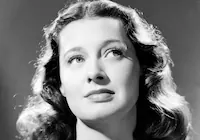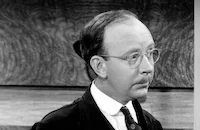My Favorite Spy

Brief Synopsis
Cast & Crew
Tay Garnett
Kay Kyser
Ellen Drew
Jane Wyman
Robert Armstrong
Helen Westley
Film Details
Technical Specs

Synopsis
On the day of his wedding to Terry, band leader Kay Kyser receives a telegram notifying him that he has been drafted and ordering him to report to camp that afternoon. As a result, Kay is forced to leave his bride immediately after the ceremony. At camp, the army brass discovers that they have inducted the wrong Kyser and after discharging Kay, ask him to join a government espionage unit investigating saboteurs operating from the Orchid Room, the ballroom in which Kay's band performs. Kay is ordered to tell no one of his assignment, and returns to civilian life, disgraced by being publicly discharged for flat feet. Kay is about to spend his first night alone with Terry when an agent phones and directs him to a waterfront dive where he is to meet his contact, Connie. At the docks, as Connie and Kay venture out into the foggy night, they witness the murder of one of their associates. In his zeal to escape, Kay rams a police car and spends the night in jail. Hoping to avoid Terry's wrath, he returns home the next morning, carried in on a stretcher, and claims that he was hit by a truck. Terry believes Kay's story until she reads the morning headlines about his arrest with a mysterious woman and stomps out of the apartment. Soon after, Kay's arranger is killed by Harry Robinson, a spy working undercover as the manager of the Orchid Room. Robinson substitues another spy as Kay's new arranger, and when Major Allen, a member of U. S. Army Intelligence, analyzes the musical score, he realizes that the notes form a coded message to be braodcast over the airwaves. Kay returns to his apartment to find Terry waiting for him, and the newlyweds are about to kiss and make up when Connie calls with instructions to meet her in ten minutes. To produce an alibi for his abrupt departure, Kay throws a flower pot at a police officer walking his beat, and when the officer comes to arrest him, Kay handcuffs him to the railing in the elevator. Kay's ruse fails, however, when Terry sees Kay and Connie climb into a cab together, and she files for an annulment. To lend credibility to Kay's disillusionment with his country, Connie instructs him to make unpatriotic remarks at a rally in the park. His remarks spark a fight with two marines, and when Robinson learns that Kay has been arrested for creating a disturbance, he takes the bait and informs the band leader that he plans to visit the Kysers that night at their apartment. Major Allen dispatches Connie to pose as Kay's wife, and when Terry returns to the apartment, Connie locks her in the closet. Soon after, Robinson and the others arrive and announce that they are taking Kay to headquarters to meet the chief. Connie assures Kay that she will trail them and send Major Allen and his men to his rescue. Immediately after Kay leaves, however, Terry struggles free and locks Connie in the closet. Meanwhile, Robinson has sensed that something is amiss, and when they reach the boarded-up theater that serves as headquarters, he accuses Kay of working for Army Intelligence. Kay is calmly awaiting Connie's reinforcements when Terry bursts in and accuses Kay of deceiving her. Dismissing Robinson's threats as another ruse, Terry slugs Kay. When the spies leave the room, Kay and Terry escape through a secret panel, but Terry still refuses to believe that they are being held captive by a gang of spies and informs Kay that she locked Connie in the closet. The spies capture Terry as she runs across the stage, but when one of the gang swings an ax at Kay, he misses and cuts the ropes to the curtains instead, sending them crashing down on the spies. After Kay subdues the saboteurs by smacking them on the heads with a mallet and nailing the curtain to the floor, he is hailed as a hero. As he and Terry return triumphantly to the Orchid Room, he encounters the officer he handcuffed in the elevator and is arrested. Determined not to spend another night without her husband, Terry cracks a flower pot over the officer's head, and the newlyweds spend their first night together in adjoining cells.

Director

Tay Garnett
Cast

Kay Kyser

Ellen Drew

Jane Wyman

Robert Armstrong

Helen Westley

William Demarest

Una O'connor
Lionel Royce

Moroni Olsen
George Cleveland
Vaughan Glaser

Hobart Cavanaugh
Chester Clute
Teddy Hart
Kay Kyser's Band
Harry Babbitt
Ish Kabibble
Sully Mason
Trudy Irwin
Dorothy Dunn
Edmund Glover
Selmer Jackson
Hal K. Dawson
Matt Moore
Charles Williams
Earle Hodgins
Henry Roquemore
Sammy Stein
Larry Lawson
Bud Geary
Fred Graham

Barbara Pepper
Dewey Robinson
Harold Daniels
Sammy Finn
Murray Alper

Vince Barnett

Warren Hymer
Ralph Sanford
Ed Dearing
Louis Adlon
Harold Kruger
Stan Blystone
Carli Elinor
Jack Norton

Roy Gordon
William Ruhl
Bert Roach
Dorothy Phillips
Frank Hagney
Tony Merrill
Crew
James A. Anderson
C. Bakaleinikoff
William Bowers
Johnny Burke
Carroll Clark
Albert S. D'agostino
George Duning
Robert De Grasse
Sig Herzig
Harold Lloyd
Desmond Marquette
Sam Ruman
Frank Ryan
Darrell Silvera
Edward Stevenson
James Van Heusen
Vernon L. Walker
Roy Webb
M. Coates Webster
Earl A. Wolcott

Videos
Movie Clip


Film Details
Technical Specs

Articles
Ellen Drew, 1914-2003
She was born Esther Loretta "Terry" Ray on November 23, 1914, in Kansas City, Missouri. The daughter of a barber, her family moved to Chicago when she was still an infant and she lived a very quiet childhood far removed from the glamour of Hollywood. She was encouraged by some friends to enter a beauty contest when she was just 17. After winning, she tried her luck in Hollywood, but found that they were no immediate offers for her particular talents.
She eventually took a waitressing job at C.C. Brown's, a famed Hollywood Boulevard soda fountain, and had virtually abandoned her dreams as a starlet when William Demarest, a popular actor's agent and well-known character actor, spotted her. Demarest arranged a screen test for her at Paramount, and she was promptly placed under contract for $50 a week.
For the first few years, (1936-38), Drew got only bit parts, and was often uncredited. When she finally got prominent billing in the Bing Crosby musical Sing You Sinners (1938), she decided to change her name, from Terry Ray to Ellen Drew. She earned her first major role in Frank Lloyd's If I Were King (1938) opposite Ronald Colman, yet for the most part of her career, rarely rose above "B" material and second leads. Still, she had some fine exceptions: Preston Sturges' enchanting comedy Christmas in July (1940), with Dick Powell; Tay Garnett's lighthearted war romp My Favorite Spy (1942) co-starring Kay Kyser; Julien Duvivier's taut The Imposter (1944), holding her own with a brooding Jean Gabin; and Mark Robson's chilling low-budget chiller Isle of the Dead (1945) opposite Boris Karloff. Drew made some notable television appearances in the late '50s including Perry Mason and The Barbara Stanwyck Show, before retiring from the entertainment industry. She is survived by her son David; five grandchildren; and five great-grandchildren.
by Michael T. Toole

Ellen Drew, 1914-2003
Quotes
Trivia
Notes
According to a December 1940 news item in Hollywood Reporter, producer Harold Lloyd was to star in this picture as a recruit caught in the draft. Lloyd does not appear in the final picture, however. Another pre-production news item in Hollywood Reporter adds singer Ginny Simms, a former member of Kay Kyser's band, to the cast, but she does not appear in the final film. William Hampton, a scriptwriter for Kyser's radio show, was to write gags for the film, according to another news item in Hollywood Reporter, but he is not credited onscreen or in other sources.
According to the records of the War Bureau of Public Relations at NARS, the War Department initially withheld its approval of this film because of inaccuracies in the script. In a memo dated December 23, 1941, Lt. Col M. W. Wright, Chief of the Pictorial Branch, objected that the story misrepresented the Army Intelligence Division by portraying it as engaging in espionage. In a January 1942 memo, Wright rejected the studio's revisions, asserting that Kyser's lack of qualifications and training prevented him from ever being called into active service as an officer. Wright suggested instead that Kyser be called to active duty by error, warning that his character must not be made to look ridiculous. To circumvent Wright's criticisms, producer Lloyd suggested a mix-up regarding Kyser's orders. A week later, on January 26, 1942, Wright rejected Lloyd's proposal, insisting that a "commissioned officer in the United States Army can not be made an object of ridicule." On February 2, 1942, William Gordon of RKO's censorship department capitulated to the government's demands, assuring the War Department that Kyser would be called to active duty by error and would be reinstated as a civilian rather than a military operative, thus avoiding any possibility of ridiculing the armed forces. A news item in Hollywood Reporter notes that in February 1942, RKO shot the additional scenes necessary to make these changes. In April 1942, the War Deparment Motion Picture Board of Review finally passed the picture for release.
According to other news items in Hollywood Reporter, the restrictions on night shooting imposed by the war forced the studio to film the night exteriors indoors using negative film stock. Other news items in Hollywood Reporter add that Jane Wyman was borrowed from Warner Bros. and Ellen Drew from Paramount. My Favorite Spy was Lloyd's last production at RKO.














